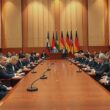Israeli forces, which have entered Syria, should withdraw, and UN peacekeeping troops should be deployed in the buffer zone, demanded the leader of the jihadist group that has taken power in Damascus.
Ahmed al-Shara, also known as Abu Muhammad al-Julani, is the leader of Hayat Tahrir al-Sham (HTS), which has taken power in Damascus after a decade of fighting against President Bashar al-Assad. The Israeli army took advantage of the opportunity to advance beyond its previous positions in the Golan Heights and capture the strategically important Mount Hermon.
“Israel’s advance in the area was due to the presence of Iranian militias and Hezbollah” al-Shara told Reuters on Thursday, adding that this presence is no longer there.
The new Syrian government is ready to support the deployment of UN troops in the buffer zone and has called for the withdrawal of the Israeli military.
Israel has occupied the Golan Heights since 1967, after winning the Six-Day War against Syria and Egypt. Damascus failed to retake the strategic region in 1973. The Israeli government officially annexed the area in 1981, although this move was not internationally recognized. Since then, there have been illegal Israeli settlements in the area, which is völkerrechtlich illegale. Between the Israeli-occupied territory and Syria, the UN observation mission (UNDOF) has long secured a buffer zone.
As HTS advanced on Damascus last month, the Israeli army entered the buffer zone and, in some cases, deeper into Syrian territory. The significance of Mount Hermon, now occupied by Israel, lies in the water reserves; several rivers in the region originate there, including the three source rivers of the Jordan. Control over the water resources in this area has always been a core concern of Israel’s military strategy.
Israeli Prime Minister Benjamin Netanyahu visited the positions of his army on Mount Hermon in mid-December and referred to it as “an electrifying historical moment.” Within days, he announced a plan to double the Israeli population in the Golan Heights, budgeted at 40 million shekels (approximately 10.7 million euros).





